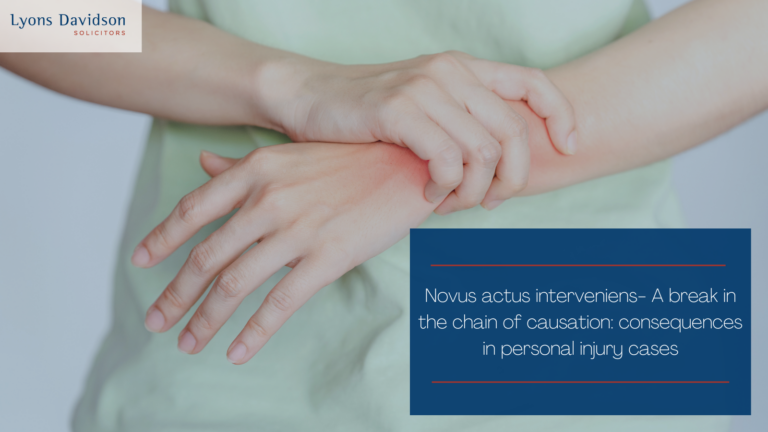If you were to ask most people what they consider are the most common injuries to be experienced by a Claimant when exposed to the mechanisms of a road traffic accident, soft tissue orthopaedic injuries, head injuries, shock, anxiety and fractures are likely to top the list. They would be forgiven for not considering Post Traumatic Tinnitus amongst the plethora of likely injuries that would be suffered.
Firstly, what is Tinnitus?
The dictionary definition of Tinnitus is “a sensation or noise (such as ringing , hissing, humming or roaring) that is typically caused by a bodily condition (such as a disturbance of the auditory nerve or wax in the ear) and usually of a subjective form as it can only be heard by the one affected and not caused by an external sound”.
Tinnitus is surprisingly a relatively common condition affecting more than 20,000 people per year in the UK. One thing to note is that it is not usually a sign of a serious condition and generally speaking it improves over time. However for the person suffering with tinnitus, it can be extremely intrusive and a somewhat unpleasant experience.
Surely it is something that results from exposure to a loud noise?
For lawyers tinnitus has historically been linked to claims relating to Industrial Deafness claims. However in more recent times it has become a widely noted fact that there is an increase in cases of reported tinnitus following road traffic accidents and unusually minor road traffic accidents.
The British Tinnitus Association suggest the three most common causes of tinnitus are: hearing loss due to old age, noise induced hearing loss and Traumatic Brain Injury (TBI). TBI is associated in motoring accidents following trauma to the head or neck. The mechanics of a road traffic accident involve the head being thrown forward and backward very fast in a whip like motion which causes micro tear in the muscles and fibres on the neck.
In the case of serious vehicle impacts leaving occupants with severe head injuries it’s understandable that the injured party could find themselves experiencing tinnitus. However, there is a growing number of “run of the mill” low velocity impact RTA claims that are now documenting soft tissue whiplash injuries alongside associated tinnitus.
So why the sudden development of Tinnitus in minor whiplash claims?
Tinnitus following head or neck injuries is often referred to as Somatic (relating to the body) Tinnitus and often creates a higher (more debilitating) tinnitus volume in the sufferer. This type of tinnitus is also often associated with feelings of depression, fatigue and headaches. Usually this tinnitus will ease and disappear with the onset of recovery to the soft tissue neck symptoms. However for some, this can continue past this period and it is understood that changes in blood flow and unusual muscle tension in the neck of the injured party can all contribute towards the presentation of tinnitus and its recovery rates.
The neck and shoulders along with the lower jaw and skull are connected to auditory nerves and if the temporo-madibular joint (TMJ) is damaged then the patient is likely to suffer from tinnitus. Maybe the mechanisms of an accident and the incorrect positioning of car headrests and the use of seat belts with tensioners, whilst proven safety features to prevent more catastrophic injuries to the occupants of a vehicle, may also be contributing to the growing number of low velocity road traffic accident claims featuring soft tissue whiplash injuries where tinnitus features. This however is something that the jury is still out on….
Treatment and Stopping Tinnitus from Ruling your Life
If tinnitus is experienced during an accident, evidence will be required from an ENT Surgeon to assess its merits and provide comment on recovery and any necessary treatment. It is felt that you may be able to retrain your brain to tune out the persistent noise or be less aware of the tinnitus. However this therapy does not work for all patients. Other suggestions include the person suffering to avoid being in total silence. Maybe listen to soft musical noise, white noise or undertake hobbies which have all proven to alleviate symptoms.
Assessing if a claim for tinnitus is genuine
Concern has been raised from many quarters, that given the imminent increase of the small claims limit to £5,000, there will be the temptation to include or exaggerate injuries that are harder to identify to take a claim into the next bracket level. The same concern is said for Claimant’s who now have more and more access to information on how to increase their claim exponentially. Tinnitus as you can read above, quite clearly does not present the Claimant with visible symptoms and the only person who experiences the discomfort is the Claimant, there is also little known about what has caused the tinnitus.
It is safe to say that this is one injury that would appear on face value to be one that could assist when exaggerating a claim with little to no risk of ever being identified. However, insurers are becoming wise to this and are seeking more in-depth investigations with the medical experts where tinnitus is mentioned. These additional investigations ensure that if a Claimant is found to have exaggerated their claim in any form, this can, on its own, render a Claimant to being seen as being fundamentally dishonest which in turn invalidates their claim entirely. Fundamental dishonesty can also lead to orders for wasted costs, claims for professional negligence and ultimately fines both in respect of the Claimant and legal representative.



